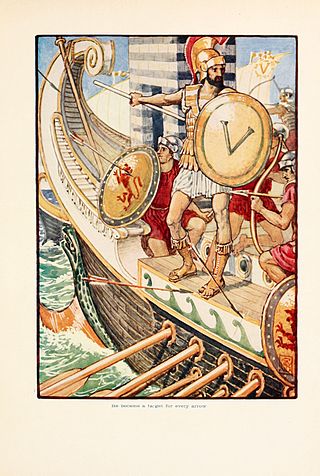
The Peloponnesian War was an ancient Greek war fought between Athens and Sparta and their respective allies for the hegemony of the Greek world. The war remained undecided for a long time, until the decisive intervention of the Persian Empire in support of Sparta. Led by Lysander, the Spartan fleet, built with Persian subsidies, finally defeated Athens and started a period of Spartan hegemony over Greece.

The 5th century BC started the first day of 500 BC and ended the last day of 401 BC.
Year 431 BC was a year of the pre-Julian Roman calendar. At the time, to Romans it was known as the Year of the Consulship of Cincinnatus and Mento. The denomination 431 BC for this year has been used since the early medieval period, when the Anno Domini calendar era became the prevalent method in Europe for naming years.
This article concerns the period 469 BC – 460 BC.
This article concerns the period 439 BC – 430 BC.
This article concerns the period 429 BC – 420 BC.
This decade witnessed the continuing decline of the Achaemenid Empire, fierce warfare amongst the Greek city-states during the Peloponnesian War, the ongoing Warring States period in Zhou dynasty China, and the closing years of the Olmec civilization in modern-day Mexico.

This is a timeline of ancient Greece from its emergence around 800 BC to its subjection to the Roman Empire in 146 BC.
Year 425 BC was a year of the pre-Julian Roman calendar. At the time, it was known as the Year of the Tribunate of Atratinus, Medullinus, Cincinnatus and Barbatus. The denomination 425 BC for this year has been used since the early medieval period, when the Anno Domini calendar era became the prevalent method in Europe for naming years.

The Peace of Nicias was a peace treaty signed between the Greek city-states of Athens and Sparta in March 421 BC that ended the first half of the Peloponnesian War.

Nicias was an Athenian politician and general during the period of the Peloponnesian War. Nicias was a member of the Athenian aristocracy and had inherited a large fortune from his father, which was invested in the silver mines around Attica's Mt. Laurium. Following the death of Pericles in 429 BC, he became the principal rival of Cleon and the democrats in the struggle for the political leadership of the Athenian state. He was a moderate in his political views and opposed the aggressive imperialism of the democrats. His principal aim was to conclude a peace with Sparta as soon as it could be obtained on terms favourable to Athens.
Cleon was an Athenian general during the Peloponnesian War. He was an early representative of the commercial class in Athenian politics; which during the early Peloponnesian war was coming into prominence - although he was an aristocrat himself. He strongly advocated for an offensive war strategy and is remembered for being ruthless in carrying out his policies. He was often depicted in a negative way, predominantly by Thucydides and the comedic playwright Aristophanes, who both represent him as an unscrupulous, warmongering demagogue. Cleon was the son of Cleaenetus.

Brasidas was the most distinguished Spartan officer during the first decade of the Peloponnesian War. He died during the Second Battle of Amphipolis while winning one of his most spectacular victories.

The History of the Peloponnesian War is a historical account of the Peloponnesian War, which was fought between the Peloponnesian League and the Delian League. It was written by Thucydides, an Athenian historian who also served as an Athenian general during the war. His account of the conflict is widely considered to be a classic and regarded as one of the earliest scholarly works of history. The History is divided into eight books.

The Battle of Amphipolis was fought in 422 BC during the Peloponnesian War between Athens and Sparta. It was the culmination of events that began in 424 BC with the capture of Amphipolis by the Spartans.

Demosthenes, son of Alcisthenes, was an Athenian general during the Peloponnesian War.

Pentecontaetia is the term used to refer to the period in Ancient Greek history between the defeat of the second Persian invasion of Greece at Plataea in 479 BC and the beginning of the Peloponnesian War in 431 BC. The term originated with a scholiast commenting on Thucydides, who used it in their description of the period. The Pentecontaetia was marked by the rise of Athens as the dominant state in the Greek world and by the rise of Athenian democracy, a period also known as Golden Age of Athens. Since Thucydides focused his account on these developments, the term is generally used when discussing developments in and involving Athens.
The First Peloponnesian War was fought between Sparta as the leaders of the Peloponnesian League and Sparta's other allies, most notably Thebes, and the Delian League led by Athens with support from Argos. This war consisted of a series of conflicts and minor wars, such as the Second Sacred War. There were several causes for the war including the building of the Athenian long walls, Megara's defection and the envy and concern felt by Sparta at the growth of the Athenian Empire.

Hippocrates of Athens, the son of Ariphron, was a strategos of the Athenians in 424 BC, serving alongside Demosthenes.
The Battle of Lyncestis/Lyncus took place in 423 BC between the allied forces of the Lyncestians and Illyrians against those of the Spartans and Macedonians. The battle was part of the wider Peloponnesian Wars. Before Athens suffered defeat at Delium in 424 BC, Sparta had sent an expedition under Brasidas to assist Perdiccas II of Macedonia and other opponents of Athens. At first Sparta avoided involvement in Macedon's war with Arrhabaeus, but in 423 BC they joined an expedition which ended with retreat by the Macedonians and a brilliantly contrived escape of the Spartans.










